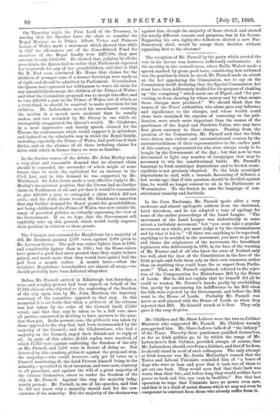Before Mr. Parnell arrived in Edinburgh last Saturday, a terse
and weighty protest had been signed, on behalf of the 17,813 citizens who objected to the conferring of the freedom of the city upon him, by Mr. John Harrison, the honorary secretary of the committee opposed to that step. In this memorial it is set forth that when a plebiscite of the citizens was last taken by the order of the Council itself, 27,650 voted; and that that may be taken to be a full vote, since all parties concurred in desiring to have answers to the ques- tion then put. In the present case, the plebiscite was taken by those opposed to the step that had been recommended by the majority of the Council ; and the Gladstonians, who had a majority on the Council, urged their friends not to reply at all. In spite of this advice, 21,014 replies were received, of which 17,813 were against conferring the freedom of the city on Mr. Parnell, and 3,201 were in favour of doing so. Not deterred by this crushing plebiscite against the proposed step, the majority,—who could, however, only get 22 votes on a Council numbering 41, the Lord Provost himself being in the minority,—persisted in their intention, and were now, contrary to all precedent, and against the will of a great majority of the citizens themselves, about to confer the freedom of the city on Mr. Parnell. Against this step the majority indig- nantly protest. Mr. Parnell, in one of his speeches, said that he did not know why a majority should wait for the con- currence of the minority. But the majority of the electors was against him, though the majority of those elected, and elected for totally different reasons and purposes, was in his favour. Supposing his own eighty-five followers elected a new Par- liamentary chief, would he accept their decision without appealing first to the electors?


































 Previous page
Previous page